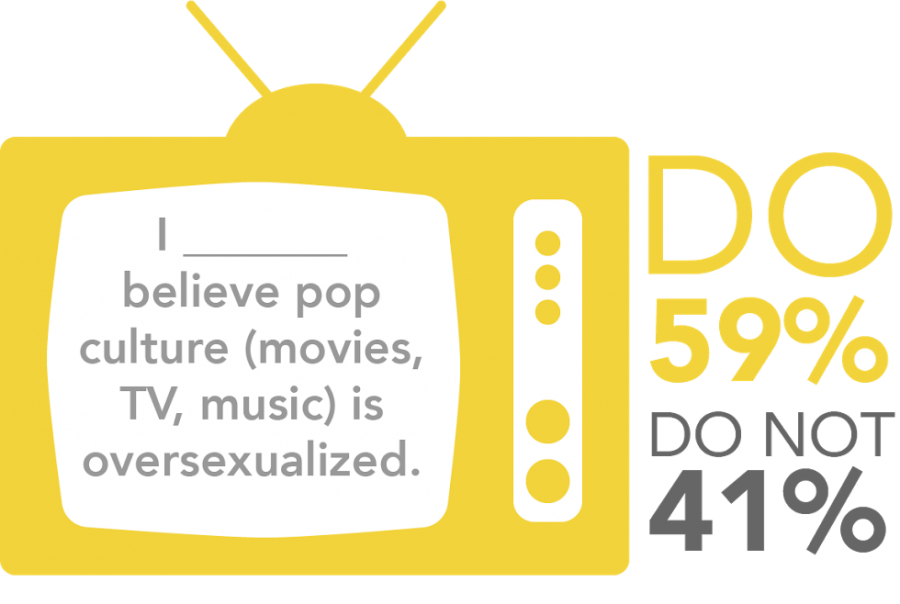The music industry says “sex sells”
Survey of 228 students from Jan. 19, 2017 to Jan. 20, 2017.
February 17, 2017
Even before Salt-N-Pepa’s 1990 iconic song “Let’s Talk About Sex,” the music world hasn’t shied away from sensual references, and studies say the word “sex” is here to stay in the pop realm.
Researchers Dawn R. Hobbs and Gordon G. Gallup Jr. at the State University of New York in Albany analyzed the lyrics of 174 songs in the Billboard Top 10 from 2009. They searched for “reproductive messages” and found that 92 percent of the songs fit into at least one of 19 themes related to evolutionary biology, from genitalia references to keeping tabs on a partner.
Eight years later, these messages are still prevalent on the charts. For the Billboard Hot 100 during the week of Feb. 18, Ed Sheeran’s “Shape of You” and Migos’s “Bad and Boujee” respectively topped the chart, and they both had a fair share of sexual innuendo. While Sheeran sings “I’m in love with your body” 15 times in his 3-minute 54-second song, Migos uses expletives to emphasis how he is having sex with your girlfriend.
These songs fall under the pop and hip-hop genres, but Hobbs and Gallup noted other genres talk about sex. Overall, hip-hop and R&B address sex and sexual relationships the most while top country songs had significantly less. The country songs analyzed had 340 sexual references, which equates to six per song while a similar number of R&B music had 973 references, equating to 17 per song.
With top songs of all genres referencing sex, the word is nearly unavoidable in the media, which some parents find concerning. The British parenting website Netmums conducted an online survey regarding parental concerns of the presence of sex in the pop culture. After surveying more than 1,500 members with children under the age of 16 in 2013, 87 percent of parents complained that modern pop stars were “far more explicit” than those from their childhood.
The survey also showed the impact of sexual innuendo on children. Eighty-two percent of children were reported to repeat sexual lyrics without realizing the meaning.
Some parents, including the Netmums founder Siobhan Freegard, fear the music is a detriment to kids’ development.
“Modern parents aren’t prudes – they know sex sells. But there’s a strong feeling that things have gone too far now. It’s toxic to tell young kids casual sex and violence are something to aspire too. Instead, if a star wants to make a statement, why not use their brain, not their body?” Freegard stated on his website.
Studies have also noted the impact of references to sex on adolescents. Under lead researcher Dr. Brian Primack, Pittsburgh University surveyed 711 teenagers, aged 13 to 18, about their sex lives and music listening habits in 2009. They categorized the subjects into three groups: those who listened to “music with explicit and aggressive sexual phrases” regularly, sometimes and not often, according to BBC News. The results showed that 45 percent of regular listeners had sex, compared to 21 percent of infrequent listeners. But Primack told BBC the study was too simplistic to provide a direct correlation between the music and sex life.
“There certainly seems to be a link, but it is hard to say whether listening to music is directly contributing to having sex earlier.”
Pepa from Salt-n-Pepa disagrees. Twenty years after “Let’s Talk About Sex,” she told the Village Voice about the importance of celebrities and stressing issues, as she did with “Let’s Talk About AIDS,” a variation of her hit song.
“I believe what’s important with people, like myself, and more celebrities getting on-board…. going to the concerts, promoting safe sex and passing out condoms, people are talking about it more. And, having this platform, kids tend to listen to celebrities a lot more because I don’t think people tend to talk about it as much in schools or churches.”
Whether the public believes sexual references in pop music open up conversation or negatively impact young listeners, it seems sex an almost ubiquitous presence in popular music.






